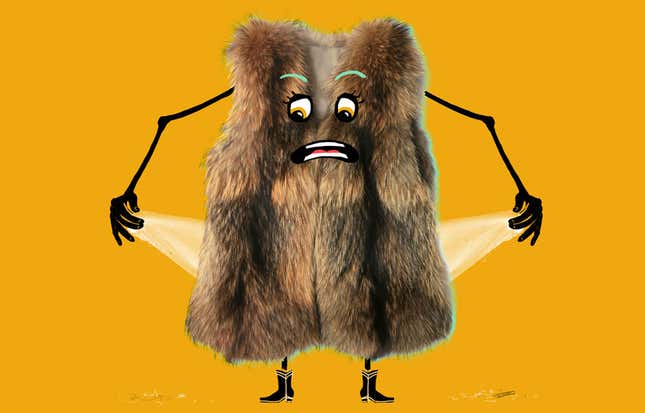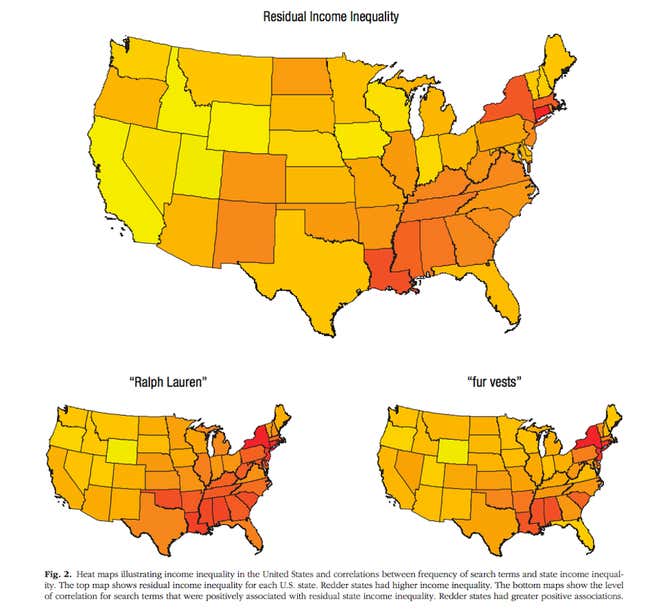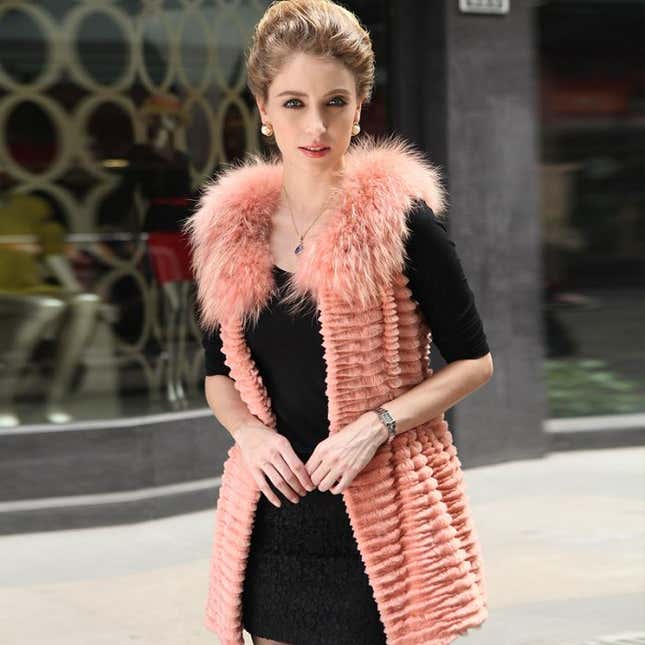
According to a new study, people who live in states with greater income inequality search online more often for “positional” goods that signify wealth. Two words: “fur vest.” Two more words: “Please stop.”
In a new study in Psychological Science, researchers at the University of Warwick used data from Google Correlate to analyze the most commonly searched terms by state. A separate, independent panel then ranked those terms to gauge their high-status bona fides. If the “social rank” theory is correct—the idea that people wear nice clothes, fancy watches, high-end denim and the like to announce their social status (like, duh)—then people in places with even greater wealth disparity are even more concerned with how rich they may appear.
In the study abstract, the researchers write:
A social-rank hypothesis predicts that members of unequal societies are likely to devote more of their resources to status-seeking behaviors such as acquiring positional goods. We used Google Correlate to find search terms that correlated with our measure of income inequality, and we controlled for income and other socioeconomic factors. We found that of the 40 search terms used more frequently in states with greater income inequality, more than 70% were classified as referring to status goods (e.g., designer brands, expensive jewelry, and luxury clothing). In contrast, 0% of the 40 search terms used more frequently in states with less income inequality were classified as referring to status goods.
Over at the Atlantic CityLab blog, we get a good visual of this in action, a “heat map” of correlation between income inequality and lust for fur vests and “Ralph Lauren” and such:

For the record this is maybe the saddest heat map I’ve ever seen, and this includes that map of all the highest-paid state employees (*cough* collegeschoolfootballcoach *cough*). The author of the Atlantic piece, Tanvi Misra, spoke with one of the authors of the study, Lukasz Walasek, who clarified that these are not purchases per se, but search terms, which may make the results even sadder: these are things only longed for, not necessarily acquired.
Walasek adds that, even though it’s hard to suss out how many of these trends in search terms are actually driven by the rich people in the state versus the poors, he feels the data “illuminates how the preoccupation with status in unequal states wastes time and energy that could be used more productively.” He then places the responsibility for this productivity on the worse off:
“There are better ways to increase your social status such as earning more money, accumulating more wealth, and saving more money—rather than keeping up with the Joneses,” he says.
Well, sure. Hey poors, could you just earn more money instead of Googling animal fur outerwear? Easier said than done (especially in a fur vest). And even though Walasek likely doesn’t mean to poor-shame, poor-shame he does. Like, you know, instead of searching for fur vests to look rich, why not go get yourself some more money so you can BE rich. Nice idea!
There are reams and reams of research as to why breaking the cycle of poverty is not easy. People don’t just become better off because someone says they sure would be better off if they would just “earn more money, accumulate more wealth, and save more money.” Poor people know that there are more meaningful ways to increase social status than vest shopping. But which is easier to get your hands on: a better job, or a shirt from Ralph Lauren?
At any rate, the real question is why the status-signal impetus is so strong. Why don’t we spend more time searching for things online that will make us actually happy and individually ourselves fashion-wise—regardless of our income—rather than simply copying the asshole trends of the upper classes? Why isn’t it seen as more important to cultivate taste rather than signify class? Class is an act. Class is a pose. It’s a way of being based on the goods, services, and experiences you’re accustomed to from how you grew up, which is mad arbitrary. Taste is set of preferences or standards from having been in the world, read books, looked at art, watched interesting films, studied how people look and move and formed an opinion about it.
People often say to “show some class” or “act like you have class” to shame someone who isn’t behaving correctly. What they really ask is nearly impossible: that you behave as if you had money you didn’t actually have, instruction you didn’t actually get, and highly specific, mannered and refined behaviors no one taught you. This is all part of a cultural standard set by people with money who often assume that everyone “below” them would like to emulate their lifestyles without scrutiny. If the rich are wearing fur vests, then the rest of us will dutifully plug in fur vest in a search engine and go limp with longing.
But as someone who grew up far out of fur vest territory, who coveted the “nice things” as much as anyone, I eventually realized that, shockingly, rich people were not necessarily people with good taste—though some undoubtedly are (or are good at hiring people with original taste to buy things for them). Rich people were and are usually just people with money who can afford to buy all the same things other people with money buy. They all have the exact same stuff! It’s actually really really weird once you start paying attention.
I live in Los Angeles now, home of the $300 T-shirt and $16 juice (good juice, though). I stopped at the farmers market in Malibu the other weekend and I was astonished at how every single middle-aged woman in a 100-foot radius was wearing the same identical outfit: Dark jeans, riding boots, cashmere sweater. These women had tanned, taut skin, disciplined bodies, and a uniform of affluence that, in lockstep, didn’t quite signify the elegance it was meant to. The women reminded me of an elementary school clique: every girl with the same identical scrunchie and ESPRIT sweatshirt, terrified of deviating from the norm lest they be ostracized.
The Malibu husbands were no less afflicted with the mania of belonging: They all wore unbelievably soft t-shirts and pricey running sneakers. OK they still had bad, distressed jeans—what is it with the men and the bad distressed jeans, someone please, god, educate me—but I bet they were very expensively distressed jeans, hand-gnawed upon by Andean Mountain cats and whiskered with endangered rattlesnake piss.
I guess my point is: fuck those people and their no-taste, money-having life. They could cultivate the coolest individual sense of style in the world—money is no object! These women could wear vintage, gorgeous 1970s wrap dresses and 1940s high-waisted pants owned by Katherine Hepburn and Marilyn Monroe’s Levi’s from The Misfits and fucking caftans spun from silk that morning, but no, for the love of all that is beautiful and sublime, no. It’s riding boots and jeans and sweaters because god forbid anyone think they didn’t live in the exact right house in Malibu. If you have money, it is your moral obligation to cultivate real taste. I can’t believe I even have to say it.
But as poors of the world, we can do one better. Cultivating our own taste is the one, possibly only angle we can have in this rigged game. You can buy thrift store clothes or wear your own working-class uniform every single day, or buy one nice thing and wear until it has holes in it because punk rock. No one, rich or poor, should be constantly Googling fur vests in order to signify anything. Fur vests signify nothing. A fur vest is not a symbol of taste. A fur vest is a nearly pure symbol of pointless, crass, indulgent wealth. It’s this:

That retails for $415.99!
Eat me.
No matter who it’s on, a fur vest does not say I’m rich. It says, I’m an asshole. Let’s not let the fur vest dictate our hopes, our dreams, our goddamn search terms. We are better than this. We have to be.
Image by Tara Jacoby, photo from Shutterstock